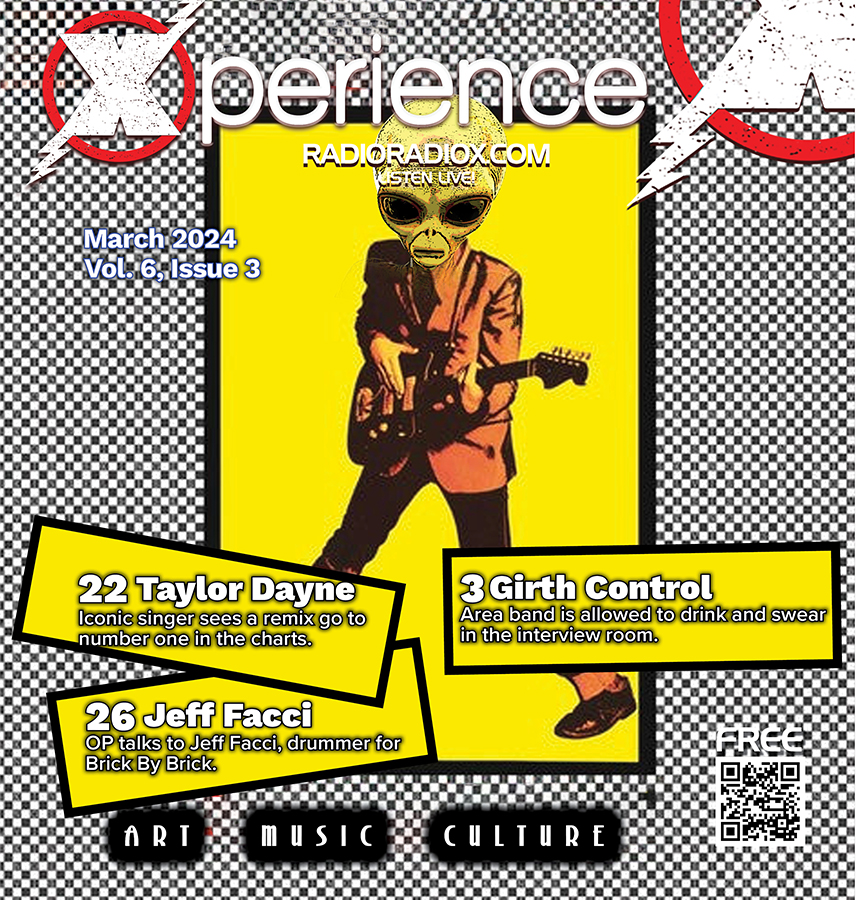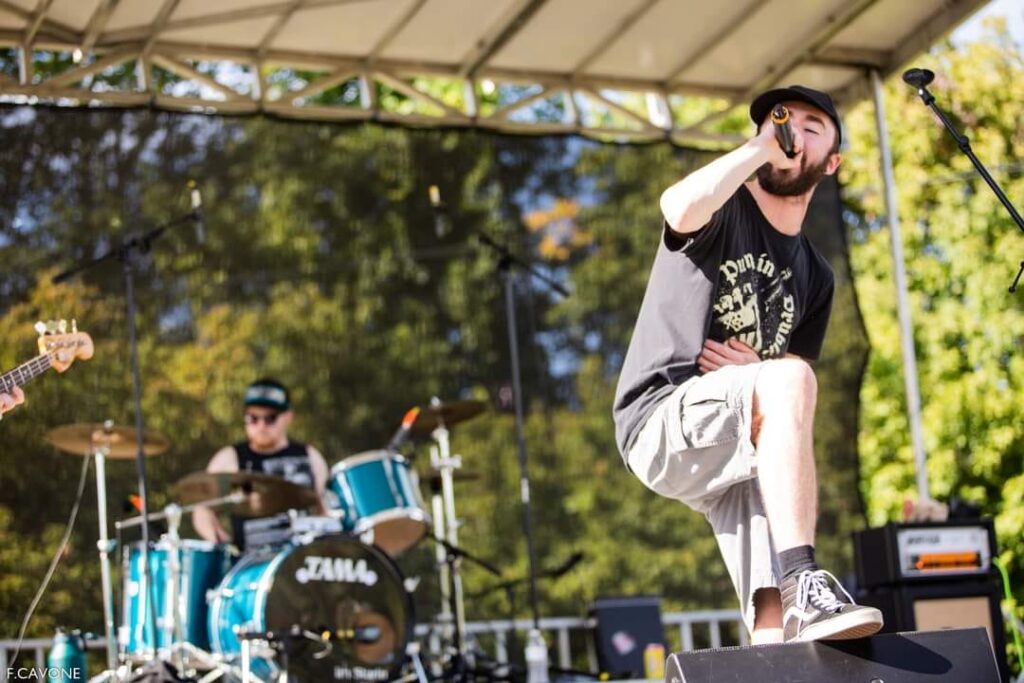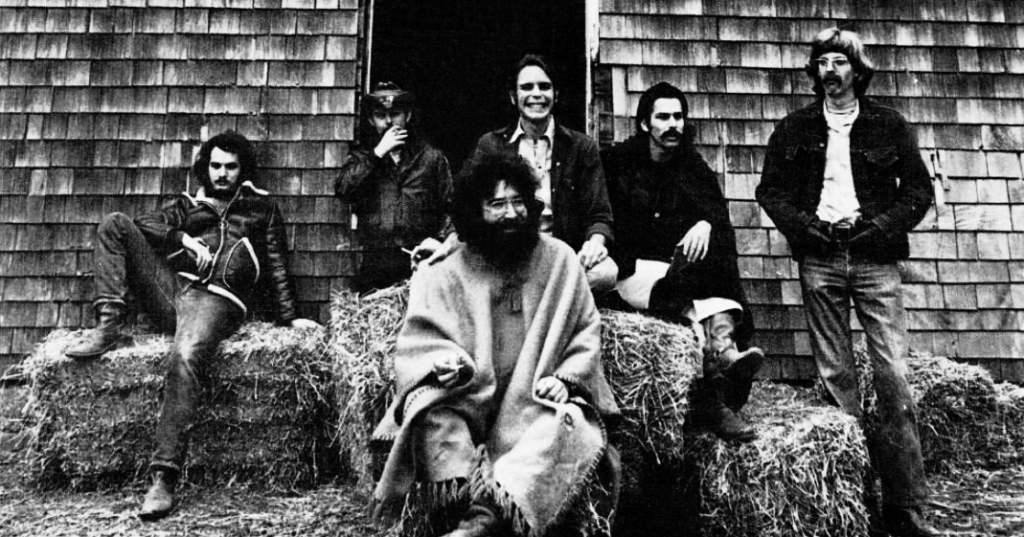An Interview with Simon Lees, the Freethinking Human Guitar By: Dan Rosen
Written by Staff on September 2, 2021
Simon Lees is a Swiss Army Knife musician. He sings like an angel, plays guitar like a demon, pens lyrics like Byron. He loves to teach guitar, and to ride his bicycle all over the West Midlands. And in his spare time, he holds bible meetings and leads the Wolverhampton choir. His “pyjamas” have a big “G-clef” emblazoned on the chest.
Okay … some of these things aren’t true. He doesn’t ride all over the Midlands. And he doesn’t wear “pyjamas”: the G -clef is a tattoo…
He’s been in a lot of bands, including Nitebreed, Budgie, and Anubis. He was the last guitarist of Budgie (well, the last good one). He’s released three superb memoir CDs – “My World,” “Freethinka,” and “Human Guitar”– as well as being one of the architects of Budgie’s last album, “We’re All Living in Cuckooland.”
And he’s probably one of the nicest blokes you’ll ever meet. (You can visit Simon at http://simonleesguitar.com)
He sat down with RadioRadio X for a chin wag:
RRX: Okay, let’s start right at the beginning. Was there a singular event that made you want to be a musician?
SL: When I was ten years old, I saw an instrumental band called Sky on a daytime TV show. Sky became famous for their version of Bach’s “Toccata Fugue in D Minor.” I was really drawn towards the drummer, whose performance I thought was “kick-ass”! He made me want to play the drums! My parents were not so keen on that, so I ended up with a guitar.
RRX: How did you get your start in performing music? When did you start singing?
SL: I did my first live performance aged nine playing the recorder at a school concert. I figured out Art Garfunkel’s “Bright Eyes” — great melody! — and performed it solo for all the parents in the main hall. I was always good at figuring out tunes; I could hear them in my head on the guitar or keyboard. Sometimes it took a while, and I wouldn’t always get them right the first time. Back then, I had absolutely no desire to be a singer, but I was the primary songwriter in my second school band, Osprey, and we couldn’t find anyone who could sing the songs properly. So I ended up doing it myself. Quite badly at first, too!
RRX: What was your first band (and what age)? Your first professional gig (how much did you get paid)?
SL: My first band was Warrior. Our music teacher would drag us out of whatever class we were in to perform for his music class! This was 1983 when I was thirteen. I remember an early Osprey gig where we sold tickets and came away with £150, our first reasonable pay check. We spent all of it on T-shirts, and they were the worst quality you can imagine. One wash and they shrank to crop-tops!
RRX: November, 1998 was a high-water mark for you. You released “My World,” your first solo CD, and you won the “Guitarist of the Year” competition sponsored by Guitarist magazine, (you were previously a finalist in 1993, ’94 & ‘95). Your song “Tribute” was on that CD. Is it true that “Tribute” was your homage to Ozzy Osbourne?
SL: Yes … in a way. A friend lent me the cassette with “Blizzard of Ozz” on side A and “Diary of a Madman” on side B. I couldn’t get past the first two songs. “I Don’t Know” was electrifying for me. The bass notes at the start gobsmacked me! The vocal melody, the riff, the solo — it was all incredible. “Crazy Train” was great, too, but if I had to pick a favourite it would be “I Don’t Know.” It was literally months before I ventured past the tepid love song (“Goodbye to Romance”) and heard “Suicide Solution,” “”Mr Crowley,” etc.
“Tribute” came about after a conversation I had with glam rock star Jim Lea of Slade. Jim said Ozzy may be looking for a new guitarist and advised me to send a demo to Sharon Osbourne. I posted the instrumental version of “Tribute” to Sharon’s accountant for him to pass on. It was very much in the Ozzy/Zakk Wylde style. When I created “My World,” I thought I’d finish the job off and write some very tongue-in-cheek lyrics.
RRX: Can you recall the circumstances of your joining Budgie in February, 2003?
SL: The phone rang while I was giving a bass lesson; it was Paul Cox from Noteworthy Productions, and he said, “Budgie needs a guitarist.” He was desperate for me to audition because they had some USA dates booked and guitarist Andy Hart had let them down. But I couldn’t make the audition because I’d booked a short holiday to Oslo to see my brother. As soon as I returned, the phone rang, and Paul repeated, ”We need a guitarist!” An audition was arranged, and I agreed to learn their stuff for it. Though I wasn’t keen on the Budgie records I’d heard, the audition material I was given was live recordings with Andy Hart on guitar. Andy is a seriously good guitarist, and I thought, “Right…this is my kind of stuff!” Andy’s take on the guitar parts was something I could really get my teeth into, and more importantly, it’s what Burke (Budgie singer/bassist Burke Shelley) wanted to hear. The audition went well, Burke and (drummer) Steve (Williams) were pretty welcoming and, after they’d had a short chat outside the rehearsal room, they offered me the job!
RRX: “We’re All Living in Cuckooland” was Budgie’s last studio album, which received mixed reviews. It was Budgie’s first studio album in 24 years, and seemed geared toward the commercial market. Can you tell us about recording it? Were you pleased with the final production?
SL: Burke was very keen on creating a modern sounding album which showed that the band had progressed. I thought if we handled it right, it would be really cool. It is cool in a lot of ways, but it was equally disappointing for me. One of my criticisms of other Budgie albums — compared to those from metal bands I listened to — was that they sounded like half-baked demos. Cuckooland was no different, in the sense that my lead guitar parts were rough demo versions. I re-recorded most of them, but Burke insisted on using the rough versions because, as he put it, “they had more magic.” They certainly had more mistakes! Steve was forced to use an electronic drum kit because the album was recorded in the basement of Burke’s apartment in Cardiff, and he had to be considerate of his neighbors. Unfortunately Burke didn’t possess the technical skills to make the electronic drums sound like real ones. Some elements of Cuckooland I do like. There are some great vocal production ideas and, as Burke has said many times, there is a section halfway through the title track’s solo where the backing vocals come in and really give a magical lift to the song. Real “hairs standing on the back of your neck” stuff.
RRX: “Cuckooland” was taken from Aristophanes’ play, “The Birds,” which is described by Wikipedia as “a perfectly realized fantasy remarkable for its mimicry of birds and for the gaiety of its songs.” Have you read it?
SL: No. The title for the album and the title track were 100% Burke’s idea. I thought Steve had a great alternative for the album title: “Ears Pierced While You Wait.”
RRX: You left Budgie in July, 2007, and the reasons given were so you could pursue a solo career and focus on teaching guitar. But there have been rumors that there was a clash between you and Burke Shelley. True? Are you and Burke still on good terms?
SL: Ha, ha — yeah, I should’ve been more honest at the time. I made two lists — pros and cons — of being in Budgie. The pros were things like “being in a famous band” and “playing bigger gigs,” albeit occasionally. The cons side took up several large sheets of paper. The final straw was when Anubis began as a side project and Burke demanded that we stop promoting Anubis on MySpace. I explained to him it was only a side-project; he called me a liar. History has proved I wasn’t! He also wasn’t keen on my One Man Rock Show, but that was my actual job, along with teaching guitar and bass! Budgie never paid me a wage. I got paid for the gigs, and that money only replaced what I lost cancelling One Man Rock Shows and lessons! Very occasionally we did a show outside the UK which paid more, but in my four years with Budgie, we averaged only five of those per year. And Burke was becoming less and less professional. Not setting his amp up properly so we’d have to restart most gigs. He’d break strings and run off stage to replace them, leaving Steve and me standing on stage looking and feeling awkward. And there were other stresses, too. I don’t speak to Burke or Steve on a regular basis, although I did have a really nice chat with Steve a few months back. I don’t hate Burke; far from it; I always got on with him … well, on a personal level. He is a nice guy; very entertaining … and funny too! He taught me a lot about the importance of playing “tight,” and I’ve since used songwriting tools that I witnessed him using. Being in Budgie definitely made me a better musician.
RRX: So Anubis already existed even before you left Budgie in 2007. How did that band start? Anubis was unusual in that it had a woman singer in a metal band. Were there any concerns about how she would be received?
SL: Anubis came about as something to do for a bit of fun. Pete Williamson had produced a backing track, to which I added lyrics, melody vocals, and guitar solos. This became “Stalked by Sadness.” I’d written an instrumental piece simply as a test track for my new PC based recording set up, which became “The Pharaoh.” Sarah Co’burn (Pete’s step-daughter) was writing songs, and Pete suggested we work on them and record them. Pete knew my Budgie predecessor, Andy Hart, very well, so he was invited to contribute. It was nice to finally meet him! I had no concerns about having a female singer in the band at all. The only concern I had was her lack of experience. She suffered dreadfully from stage-fright and although we gave her all the support we could, it got too much for her and she left eventually. She provided the band with some truly brilliant and quirky songs, though, and it was fun bringing her roughly-recorded demos to life. Anubis wasn’t a serious band, to be honest. We released some stuff on My Space, attracted some fans, made a couple of albums and played a handful of gigs. It was more of a social thing for us, I think, and we had some fun with it. After the seriousness and stress of Budgie, it was a blessed relief!
RRX: Teaching guitar seems to be a constant over the course of your career, something you seem to take extremely seriously. Why such dedication to teaching? Are you aware that Randy Rhoads frequently took guitar lessons from local instructors while on tour with Ozzy?
SL: I’m a massive fan of Ozzy’s music, so, yeah, I’ve read all about Randy. Teaching guitar became a way of avoiding having to get a “proper job.” I wasn’t a great teacher at first, but it’s like everything I’ve done: I always want to improve and be better. My dad started as an engineer, but later became a college lecturer. He helped me with maths and physics and was a fantastic teacher. What impressed me was his patience and his ability to explain the same thing in different ways to find a way that I understood. I have tried to replicate his attitude and teaching methods for the benefit of my students. It matters to me that they have the best experience possible.
RRX: Your One Man Rock Show seems to be a steady part of your performance repertoire. Are you still doing it?
SL: My One Man Rock Show has been my main source of income since 1995, including my tenure with Budgie. At the end 2018 the gigs literally dried up overnight. One good thing I’ve got from the Covid pandemic is this: not being able to perform live has really intensified my desire to do so, and also to create new music. Music has been my job for over 25 years, and for a lot of that time, it has felt like a treadmill. Even so, I wouldn’t have swapped it for anything else; working mostly for myself has been very much preferable to working for a company. Right now I’m probably as passionate about making music as I was in my late teens, which is a big improvement over recent years!
Unfortunately, my One Man Rock Shows are probably a thing of the past now. At the moment, I can’t see them continuing.
RRX: I know you’re a cycling enthusiast. How long have you been riding? How did you get into it? What’s your average mileage per week (or month)?
SL: Now you’re talking … ha,ha! I got into cycling when I was a young kid. I lived in a village five miles south-west of Wolverhampton called Wombourne. I didn’t have a lot of friends close by so I used to go exploring on my bike. It was my only mode of transport and I still think of it as a valid way to get around. The challenge for me was to ride as far as I could in a day. When I was sixteen my cousin and I rode to Church Stretton near the Welsh border and back in one day. That was around seventy miles, which was a long way on the heavy, old, steel Raleigh racers we had. I did my first century when I was 21 shortly after my engineering apprenticeship came to an end. I went from Wolverhampton to Worcester, then Leominster, up to Church Stretton, then back home. 121 miles in total and I think it took me about 11 hours or so! I didn’t keep it up though, so apart from brief periods of a couple of months a year, I didn’t ride much at all. As my 41st birthday loomed my wife asked, “What do you want for your birthday?” I told her I’d never had a really nice bike. Bikes these days are hugely expensive, but she gave me some money towards one and over the next ten years I clocked up over 42.000 miles! Between 2014 and 2020 I averaged 100 miles per week, but I’ve now decided to reduce that slightly to give me more time to get back to creating music.
RRX: What are your most recent projects? Can we expect any new music from you?
SL: I’ve recorded some guitar parts for a project called Bioscope, the brainchild of Paul Hodson, who produced a demo I recorded with the Red House Snakes. The Snakes band leader was Gary Grocutt, and it had been thirty years since I’d really spoken to Paul. He has connections with many bands in the melodic hard rock fraternity, such as Magnum. Paul asked me to play some frantic and furious lead guitar on his latest tunes, so that’s kept my fingers very busy for part of 2021. I would describe the genre of Bioscope’s material as “Epic Metal.” Really big sounding production, keyboards, classical and prog influences with great vocals, great hooks and very melodic. The lead guitar parts I’ve created have really pushed me to the limit of what I can do, but I’ve managed to squeeze a decent amount of my personality in there amongst the millions of notes!
I currently play bass and sing in a three-piece function band called Sonic Boom. It’s a brilliant band and features the best frontman I’ve ever worked with, Matt Smith, along with my old Anubis bandmate, Kevin Bartlett, who is a phenomenal drummer and sound engineer.
I have just bought a new recording PC and it’s loaded with software that is already inspiring me to play and create new stuff so, yeah I am all set to get creative again. Really looking forward to it!
RRX: What is your musical guilty pleasure and what currently is on your music radar?
SL: There are many things I listen to that people might find odd, but I listen to them for different reasons. I have a CD of medieval music, played on authentic instruments from that era. On my holiday playlist I have an album by Scottish folk singer and multi-instrumentalist Julie Fowlis. Her voice is gorgeous and she sings in Gaelic; I have absolutely no idea what she’s singing about, but it sounds great! She was featured on Mike Harding’s radio show, which I managed to hear driving home from Cardiff after a Budgie rehearsal/recording session. Another genre of music I like where the lyrics are difficult to work out is reggae dance hall. I have about twenty CDs of that stuff on the Greensleeves record label from around 2000-1. I listen to it largely ’cause it makes me laugh! I just love funny accents. I suppose, going back to my recorder virtuoso days, I still think “Bright Eyes” is a great tune!



 RadioRadioX
RadioRadioX